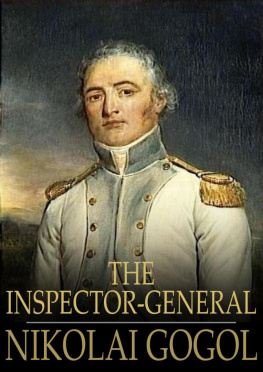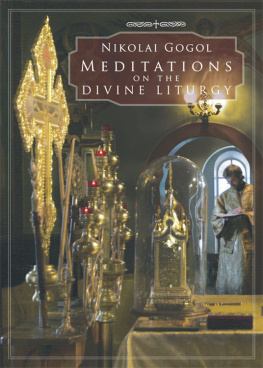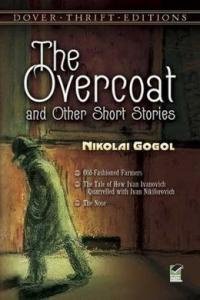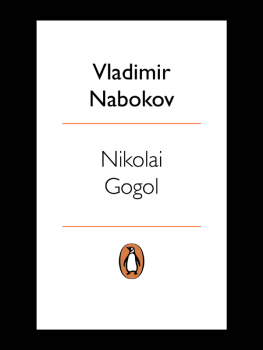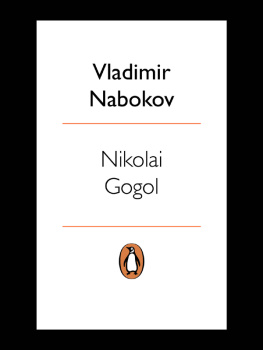Nikolai Gogol - The Inspector-General
Here you can read online Nikolai Gogol - The Inspector-General full text of the book (entire story) in english for free. Download pdf and epub, get meaning, cover and reviews about this ebook. year: 2011, publisher: The Floating Press, genre: Art / Prose. Description of the work, (preface) as well as reviews are available. Best literature library LitArk.com created for fans of good reading and offers a wide selection of genres:
Romance novel
Science fiction
Adventure
Detective
Science
History
Home and family
Prose
Art
Politics
Computer
Non-fiction
Religion
Business
Children
Humor
Choose a favorite category and find really read worthwhile books. Enjoy immersion in the world of imagination, feel the emotions of the characters or learn something new for yourself, make an fascinating discovery.
- Book:The Inspector-General
- Author:
- Publisher:The Floating Press
- Genre:
- Year:2011
- Rating:4 / 5
- Favourites:Add to favourites
- Your mark:
- 80
- 1
- 2
- 3
- 4
- 5
The Inspector-General: summary, description and annotation
We offer to read an annotation, description, summary or preface (depends on what the author of the book "The Inspector-General" wrote himself). If you haven't found the necessary information about the book — write in the comments, we will try to find it.
The Inspector-General — read online for free the complete book (whole text) full work
Below is the text of the book, divided by pages. System saving the place of the last page read, allows you to conveniently read the book "The Inspector-General" online for free, without having to search again every time where you left off. Put a bookmark, and you can go to the page where you finished reading at any time.
Font size:
Interval:
Bookmark:

A Comedy in Five Acts
First published in 1836
ISBN 978-1-775451-55-6
2011 The Floating Press
The Inspector-General is a national institution. To place a purelyliterary valuation upon it and call it the greatest of Russian comedieswould not convey the significance of its position either in Russianliterature or in Russian life itself. There is no other single work inthe modern literature of any language that carries with it the wealth ofassociations which the Inspector-General does to the educated Russian.The Germans have their Faust; but Faust is a tragedy with a cosmicphilosophic theme. In England it takes nearly all that is implied in thecomprehensive name of Shakespeare to give the same sense of bigness thata Russian gets from the mention of the Revizor.
That is not to say that the Russian is so defective in the criticalfaculty as to balance the combined creative output of the greatestEnglish dramatist against Gogol's one comedy, or even to attribute toit the literary value of any of Shakespeare's better plays. What theRussian's appreciation indicates is the pregnant role that literatureplays in the life of intellectual Russia. Here literature is not aluxury, not a diversion. It is bone of the bone, flesh of the flesh, notonly of the intelligentsia, but also of a growing number of the commonpeople, intimately woven into their everyday existence, part and parcelof their thoughts, their aspirations, their social, political andeconomic life. It expresses their collective wrongs and sorrows, theircollective hopes and strivings. Not only does it serve to lead themovements of the masses, but it is an integral component element ofthose movements. In a word, Russian literature is completely bound upwith the life of Russian society, and its vitality is but the measure ofthe spiritual vitality of that society.
This unique character of Russian literature may be said to have had itsbeginning with the Inspector-General. Before Gogol most Russian writers,with few exceptions, were but weak imitators of foreign models.The drama fashioned itself chiefly upon French patterns. TheInspector-General and later Gogol's novel, Dead Souls, established thattradition in Russian letters which was followed by all the great writersfrom Dostoyevsky down to Gorky.
As with one blow, Gogol shattered the notions of the theatre-goingpublic of his day of what a comedy should be. The ordinary idea of aplay at that time in Russia seems to have been a little like ourown tired business man's. And the shock the Revizor gave those earlynineteenth-century Russian audiences is not unlike the shocks weourselves get when once in a while a theatrical manager is courageousenough to produce a bold modern European play. Only the intensity ofthe shock was much greater. For Gogol dared not only bid defiance to theaccepted method; he dared to introduce a subject-matter that under theguise of humor audaciously attacked the very foundation of the state,namely, the officialdom of the Russian bureaucracy. That is why theRevizor marks such a revolution in the world of Russian letters. In formit was realistic, in substance it was vital. It showed up the rottennessand corruption of the instruments through which the Russian governmentfunctioned. It held up to ridicule, directly, all the officials ofa typical Russian municipality, and, indirectly, pointed to the samesystem of graft and corruption among the very highest servants of thecrown.
What wonder that the Inspector-General became a sort of comedy-epic inthe land of the Czars, the land where each petty town-governor is almostan absolute despot, regulating his persecutions and extortions accordingto the sage saying of the town-governor in the play, "That's the way Godmade the world, and the Voltairean free-thinkers can talk against itall they like, it won't do any good." Every subordinate in the townadministration, all the way down the line to the policemen, follownotalways so scrupulouslythe law laid down by the same authority, "Graftno higher than your rank." As in city and town, so in village andhamlet. It is the tragedy of Russian life, which has its roots in thatmore comprehensive tragedy, Russian despotism, the despotism that givesthe sharp edge to official corruption. For there is no possible redressfrom it except in violent revolutions.
That is the prime reason why the Inspector-General, a mere comedy, hassuch a hold on the Russian people and occupies so important a placein Russian literature. And that is why a Russian critic says, "Russiapossesses only one comedy, the Inspector-General."
The second reason is the brilliancy and originality with which thisnational theme was executed. Gogol was above all else the artist. He wasnot a radical, nor even a liberal. He was strictly conservative. Whilehating the bureaucracy, yet he never found fault with the systemitself or with the autocracy. Like most born artists, he was stronglyindividualistic in temperament, and his satire and ridicule were aimednot at causes, but at effects. Let but the individuals act morally, andthe system, which Gogol never questioned, would work beautifully. Thisconception caused Gogol to concentrate his best efforts upon delineationof character. It was the characters that were to be revealed, theiractions to be held up to scorn and ridicule, not the conditions whichcreated the characters and made them act as they did. If any lesson atall was to be drawn from the play it was not a sociological lesson, buta moral one. The individual who sees himself mirrored in it may be movedto self-purgation; society has nothing to learn from it.
Yet the play lives because of the social message it carries. Thecreation proved greater than the creator. The author of the Revizor wasa poor critic of his own work. The Russian people rejected hisestimate and put their own upon it. They knew their officials and theyentertained no illusions concerning their regeneration so long as thesystem that bred them continued to live. Nevertheless, as a keen satireand a striking exposition of the workings of the hated system itself,they hailed the Revizor with delight. And as such it has remained gravenin Russia's conscience to this day.
It must be said that "Gogol himself grew with the writing of theRevizor." Always a careful craftsman, scarcely ever satisfied with thefirst version of a story or a play, continually changing and rewriting,he seems to have bestowed special attention on perfecting this comedy.The subject, like that of Dead Souls, was suggested to him by the poetPushkin, and was based on a true incident. Pushkin at once recognizedGogol's genius and looked upon the young author as the rising starof Russian literature. Their acquaintance soon ripened into intimatefriendship, and Pushkin missed no opportunity to encourage and stimulatehim in his writings and help him with all the power of his greatinfluence. Gogol began to work on the play at the close of 1834, when hewas twenty-five years old. It was first produced in St. Petersburg,in 1836. Despite the many elaborations it had undergone before Gogolpermitted it to be put on the stage, he still did not feel satisfied,and he began to work on it again in 1838. It was not brought down to itspresent final form until 1842.
Font size:
Interval:
Bookmark:
Similar books «The Inspector-General»
Look at similar books to The Inspector-General. We have selected literature similar in name and meaning in the hope of providing readers with more options to find new, interesting, not yet read works.
Discussion, reviews of the book The Inspector-General and just readers' own opinions. Leave your comments, write what you think about the work, its meaning or the main characters. Specify what exactly you liked and what you didn't like, and why you think so.

